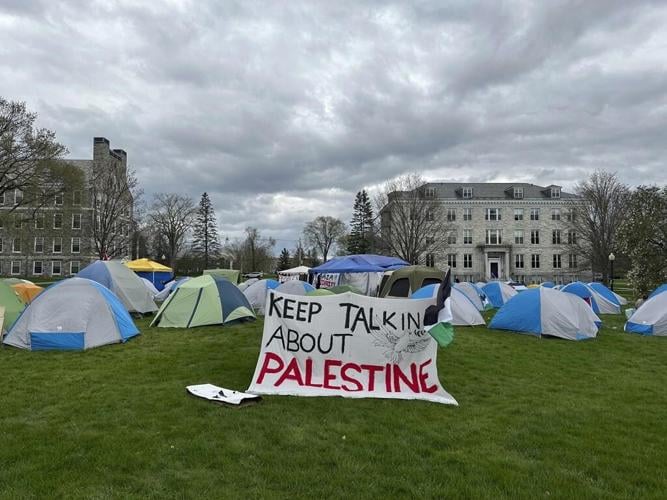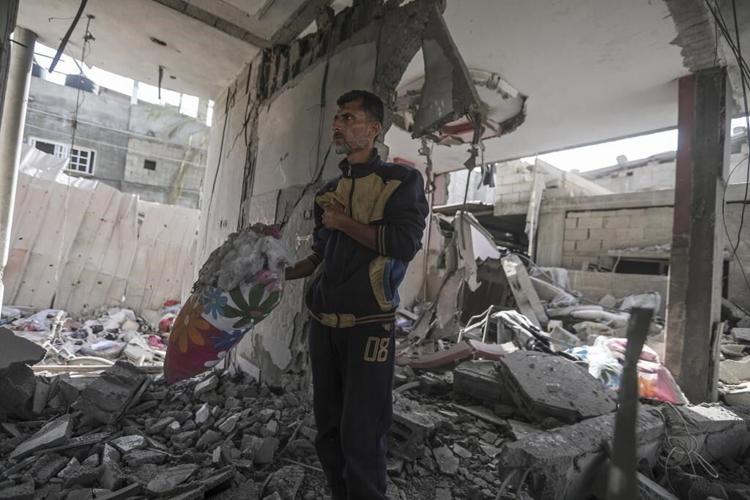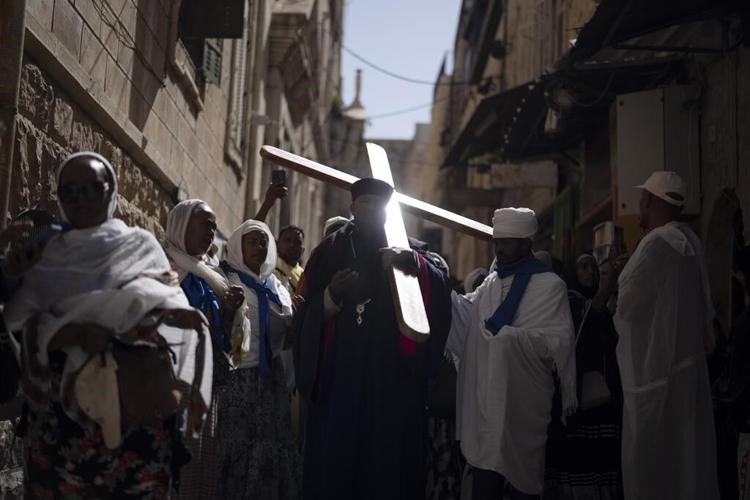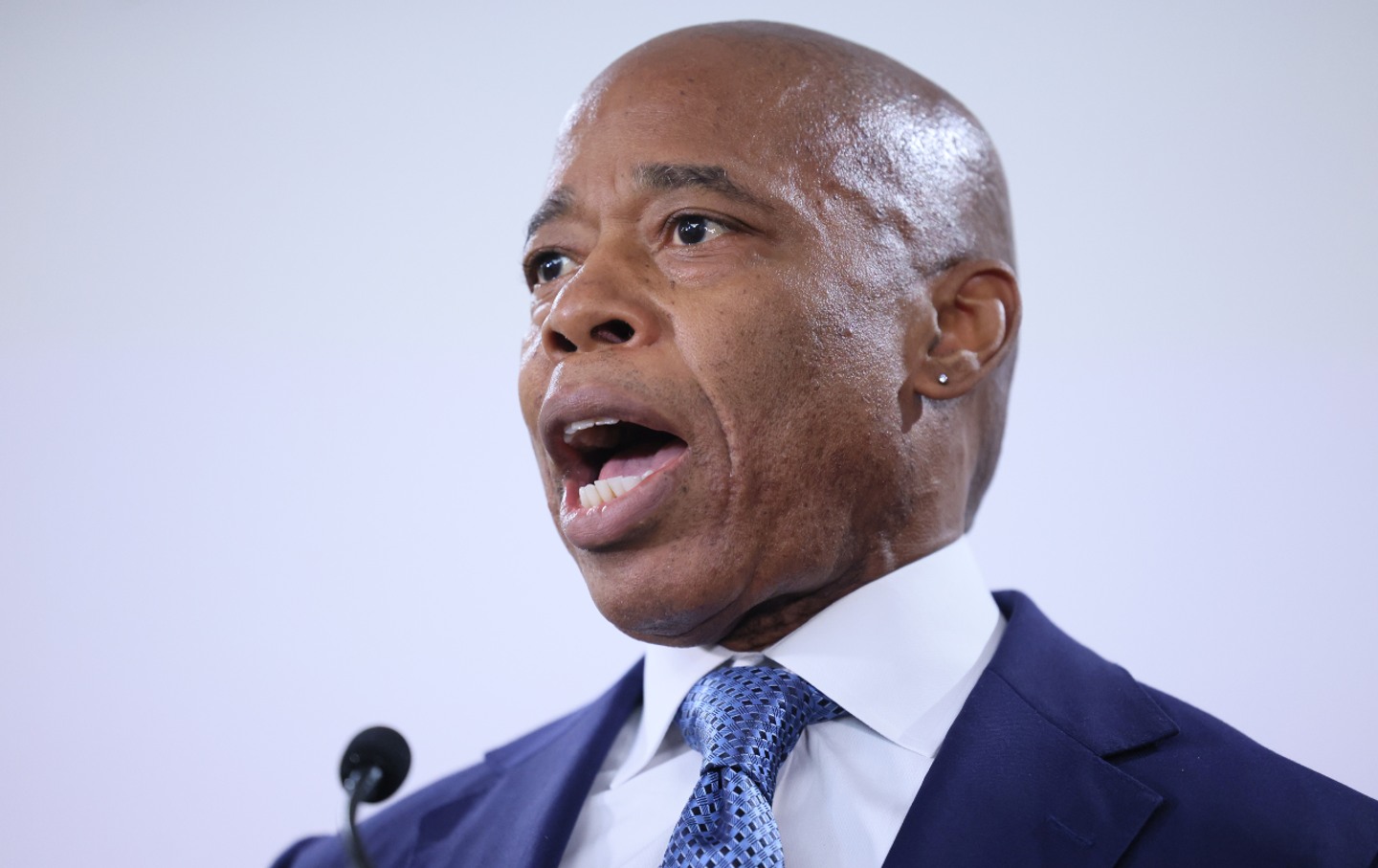May 3, 2024

A student encampment is shown at Middlebury College as they protest the Israel-Hamas war in Middlebury, Vt., on Thursday, May 2, 2024. (AP Photo/Lisa Rathke)

A man stands in the ruins of the Chahine family home, after an overnight Israeli strike that killed at least two adults and five boys and girls under the age of 16 in Rafah, southern Gaza Strip, Friday, May 3, 2024. An Israeli strike on the city of Rafah on the southern edge of the Gaza Strip killed several people, including children, hospital officials said Friday. (AP Photo/Ismael Abu Dayyah)
MMA

Ethiopian Orthodox Christian worshippers walk the Way of the Cross procession that commemorates Jesus Christ's crucifixion on Good Friday, in the Old City of Jerusalem,
Friday, May 3, 2024. (AP Photo/Leo Correa)
The United Nations humanitarian aid agency says hundreds of thousands of people would be “at imminent risk of death” if Israel carries out a military assault in the southern Gaza city of Rafah. The border city is a critical entry point for humanitarian aid and is filled with displaced Palestinians, many in densely packed tent camps.
An Israeli airstrike in Rafah overnight Friday killed seven people — mostly children. The Biden administration, which provides Israel crucial military and diplomatic support, says it opposes a Rafah invasion unless Israel provides a “credible” plan for protecting civilians there.
Turkey, an important Israeli trading partner, has suspended all imports and exports to Israel. The country's trade minister says the move was in response to “the deterioration and aggravation of the situation in Rafah."
International mediators are trying to broker a cease-fire deal between Israel and Hamas, and a leaked truce proposal hints at compromises by both sides after months of stalemated negotiations.
The Israel-Hamas war has driven around 80% of Gaza’s population of 2.3 million from their homes, caused vast destruction in several towns and cities, and pushed northern Gaza to the brink of famine. The death toll in Gaza has soared to more than 34,500 people, according to local health officials, and the territory’s entire population has been driven into a humanitarian catastrophe.
The war began Oct. 7 when Hamas attacked southern Israel, abducting about 250 people and killing around 1,200, mostly civilians. Israel says militants still hold around 100 hostages and the remains of more than 30 others.
Currently:
— Hamas is sending a delegation to Egypt for further cease-fire talks in the latest sign of progress. What’s on the table for Israel and Hamas in the latest cease-fire talks?
— Colombia breaks diplomatic ties with Israel, but its military relies on key Israeli-built equipment.
— Turkey halts all trade with Israel over military actions in Gaza.
— Nearly 2,200 people have been arrested during pro-Palestinian protests on U.S. college campuses.
— The unprecedented destruction of housing in Gaza hasn’t been seen since World War II, the United Nations says.
Follow AP’s coverage of the war at https://apnews.com/hub/israel-hamas-war
Here's the latest:
UN says Israeli civilians vandalized some humanitarian aid as convoy traveled through West Bank
UNITED NATIONS — The United Nations reports that a U.N. convoy carrying humanitarian aid from Jordan to Gaza had “a limited amount of goods” vandalized by Israeli civilians when it went through the West Bank. It was also rerouted by armed men when it entered Gaza to the wrong U.N. facility.
U.N. deputy spokesman Farhan Haq told reporters Friday “there was a miscommunication” with the convoy Wednesday and the trucks were ultimately directed to the U.N. World Food Program warehouse in Beit Hanoun.
Referring to Hamas, he said the U.N. has clarified the misunderstanding with “the de facto authorities in Gaza to ensure that this doesn’t happen again.” They reiterated their commitment to respect the delivery of humanitarian aid, he said.
“All of the goods have been subsequently accounted for and are being distributed by the U.N.,” Haq said.
The U.N. humanitarian office reported that the convoy started in Jordan and entered Gaza “via back-to-back transfer at Erez crossing, following inspection by Israeli authorities only at Allenby Bridge,” he said.
The bridge links Jordan to the West Bank, and Haq said “Going through the West Bank, Israeli civilians offloaded and vandalized a limited amount of goods from the convoy,” which included food parcels, sugar, rice, supplementary food for those malnourished and milk powder.
The U.N. doesn’t think the incident should impact further aid deliveries from Jordan, Haq said.
Biden to host Jordan’s King Abdullah II for talks at the White House
WASHINGTON — President Joe Biden will host Jordan’s King Abdullah II for talks at the White House next week in the midst of the latest push for a cease-fire deal to end the Israel-Hamas war can soon be reached, according to the White House.
White House press secretary Karine Jean-Pierre confirmed that the private talks would happen at some point next week but did provide further details.
The meeting comes as Israel and Hamas were negotiating a potential cease-fire in Gaza and the return of Israeli hostages. A leaked truce proposal hints at compromises by both sides after months of stalemated talks.
Biden last hosted Abdullah, a close ally, for White House talks in February.
Israel to seek to reduce economic ties between Turkey and the Palestinians in retaliation for Turkey’s trade ban with Israel
JERUSALEM — Israel said Friday it will seek to reduce economic ties between Turkey and the Palestinians in the occupied West Bank and Gaza in retaliation for Turkey’s trade ban with Israel over its military actions in Gaza.
Foreign Minister Israel Katz said Turkish President Recep Tayyip Erdogan “wants to harm Israel” with the ban “but will primarily harm the Palestinian economy.”
The Foreign Ministry said it would take “action to minimize all economic ties between Turkey and the Palestinian Authority and Gaza.”
It did not elaborate on how it would do so. Israel controls all entry points into the occupied West Bank, both through its own territory and from neighboring Jordan. It imposes inspections on good entering the West Bank but has imposed a wholesale block on imports, though it did stop all Palestinian exports to Israel for weeks in 2020 during a trade dispute with the Palestinian Authority.
Multiple times in the past, it has withheld customs duties on imports that it collects on behalf of the authority, which controls enclaves around the West Bank. Since the war with Hamas began in October, it has blocked entry to almost all commercial goods to Gaza, except for a trickle of supplies along with international aid entering the territory.
After Israel, Turkey is the largest importer to the Palestinian Authority, accounting for about 18% of its imports.
The ministry said it would also seek sanctions against Turkey at international economic forums for violating trade agreements.
“The Israeli economy is strong, and the Turkish economy will be much more affected than the Israeli economy due to the trade balance between the countries. It’s a mistake Erdogan will regret,” Katz said.
Turkey imposed the ban on Thursday, suspending all imports and exports to Israel. Erdogan said his country could no longer “stand by and watch” the violence in Gaza.
A 23-year-old Israeli originally believed abducted by Hamas was killed during the militants’ Oct. 7 attack, military and support group say
JERUSALEM — The Israeli military and a support group for the families of Israeli hostages confirmed Friday that Elyakim Libman, a 23-year-old Israeli who had been believed abducted by Hamas, was killed during the militants’ Oct. 7 attack. His body was found in Israel.
The Hostages Families Forum Headquarters said Libman was working as a security guard at a music festival that was attacked by the militants after they stormed out of Gaza. It said he helped evacuate the wounded during the mayhem before being killed.
The military said it, the police and forensic officials had identified the body after it was found in Israeli territory.
At least 260 people were killed at the Nova music festival, taking place in an open space near Gaza when Hamas militants rampaged through communities in southern Israel. Some 1,200 people were killed in the attack, and militants took around 250 hostage. Because of the chaos of the day, a few believed taken captive were later determined to be among the dead.
Israel says Hamas is holding about 100 hostages and the remains of more than 30 others in Gaza, after many were released during a weeklong cease-fire in November. Since the Oct. 7 attack, Israel’s bombardment and offensive in Gaza has killed more than 34,500 Palestinians.
CIA chief arrives in Egypt as Hamas considers cease-fire accord with Israel
CAIRO — Two Egyptian security officials say CIA director William Burns has arrived in Egypt amid a push to seal a cease-fire accord between Israel and Hamas in the Gaza war.
Burns’ visit comes as Hamas is considering the latest proposal for a cease-fire and hostage release put forward by U.S., Egyptian and Qatari mediators, who hope to avert an Israeli offensive against Rafah, Gaza’s southernmost town.
Hamas has said it will send a delegation to Cairo in the coming days for further discussions on the offer, though it has not specified when.
The two Egyptian officials, who spoke on condition of anonymity because they were not authorized to brief the press, did not give details on Burns’ visit. U.S. officials would not comment on the report.
The latest proposal reportedly calls for a three-stage cease-fire, starting with a six-week halt in fighting during which Hamas would release a number of hostages it holds, including women and elderly, in exchange for the release of hundreds of Palestinians held in Israeli prisons. Talks would then take place on a permanent calm, during which Israel would withdraw troops from Gaza and Hamas would release all the remaining hostages.
An Egyptian official has said Hamas is seeking firmer language in the text to ensure a complete Israeli withdrawal from Gaza and an end to its offensive and bombardment – as well as the return of Palestinians displaced from the north of the territory.
On Thursday, Hamas supreme leader Ismail Haniyeh said he had spoken to Egypt’s intelligence chief and “stressed the positive spirit of the movement in studying the cease-fire proposal.”
Hamas is believed to still hold around 100 Israelis in Gaza, as well as the bodies of around 30 others who died in captivity. Israel launched its campaign in Gaza vowing to destroy Hamas after the group’s Oct. 7 attack on southern Israel.
2 PALESTINIANS FROM GAZA DIED IN ISRAELI CUSTODY, INCLUDING A SURGEON FROM SHIFA HOSPITAL, GROUP SAYS
BEIRUT — The Palestinian Prisoner’s Club said two Palestinian detainees from Gaza have died in Israeli custody, including a prominent surgeon seized by troops during a raid on a hospital.
The cause of their deaths was not immediately known. Israeli and Palestinian rights groups have reported harsh conditions in Israeli prisons for the hundreds of Palestinians detained from Gaza, including beatings and medical neglect.
The Israeli prison authority and army officials had no comment.
The surgeon, Dr. Adnan al-Borsh, 50, was head of the orthopedic department in Gaza City’s Shifa hospital. After an Israeli siege in November crippled Shifa, he worked in nearby al-Awda Hospital, which Israeli troops later stormed, detaining him and others inside in December.
Abdullah al-Zaghari, head of the Palestinian Prisoner’s Club, said they were informed by the Palestinian Administrative Affairs office, which coordinates with the Israeli military, that al-Borsh died in Ofer Prison in the West Bank on April 19. He said the body was still being held by Israeli authorities.
White House Press Secretary Karine Jean Pierre said she could not speak specifically about the case but that it was “devastating to hear” that a doctor was killed.







